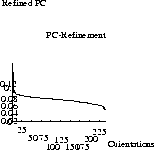 ) and the
individual orientations (
) and the
individual orientations ( ) and translations
(
) and translations
( ) of the four domains of the Fab can be
carried out by minimization against a
target function defined as
) of the four domains of the Fab can be
carried out by minimization against a
target function defined as
The next step is to carry out PC-refinement of the highest peaks of the
rotation function. PC-refinement (Brünger 1990)
of the overall orientation ( ) and the
individual orientations (
) and the
individual orientations ( ) and translations
(
) and translations
( ) of the four domains of the Fab can be
carried out by minimization against a
target function defined as
) of the four domains of the Fab can be
carried out by minimization against a
target function defined as
where

The angle brackets denote an averaging over the set of observed
reflections expanded to  .
.
 denotes the normalized observed
structure factors, and
denotes the normalized observed
structure factors, and  denotes the
normalized structure
factors of the search model
placed
in a triclinic unit cell identical in geometry to
that of the crystal.
denotes the
normalized structure
factors of the search model
placed
in a triclinic unit cell identical in geometry to
that of the crystal.
In the following example, PC-refinements of the search model are carried out where the model is oriented according to each of the 240 selected peaks of the rotation function listed in the file ``rotation.rf".
This file produces a new listing stored in the file ``filter.list". It contains the results of the PC-refinement. The following shows a few lines of this file:
20.765 70 253.45 20.173 68.125 253.61 1 1.2 1.08E-02 3.03E-02 7.10E-02 35.554 75 68.657 36.231 76.77 70.961 6 1.1 2.29E-02 2.97E-02 6.13E-02 9.555 67.5 257.06 10.617 65.649 254.72 7 1.1 1.13E-02 2.02E-02 5.75E-02 34.519 75 249.69 33.645 72.563 251.84 8 1.1 1.97E-02 2.97E-02 6.51E-02It lists the orientations before and after PC-refinement and the correlation coefficients at various stages of the refinement process. The number in the last column, the most interesting one, can be plotted by using the following Mathematica script:
The result of the filtering procedure is shown in Fig. 17.3.

Figure 17.3: Rotation function after PC-refinement.
A single peak is produced. It corresponds to the
orientation
( =274.45,
=274.45,  =35,
=35,  =324.68)
before and
(
=324.68)
before and
( =275.06,
=275.06,  =34.905,
=34.905,  =324.7)
after PC-refinement.
=324.7)
after PC-refinement.